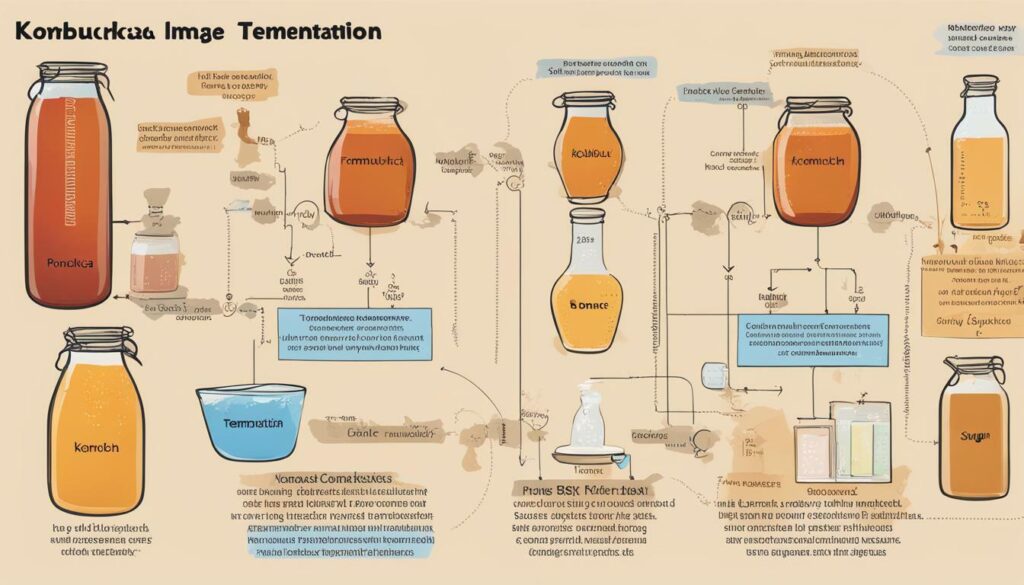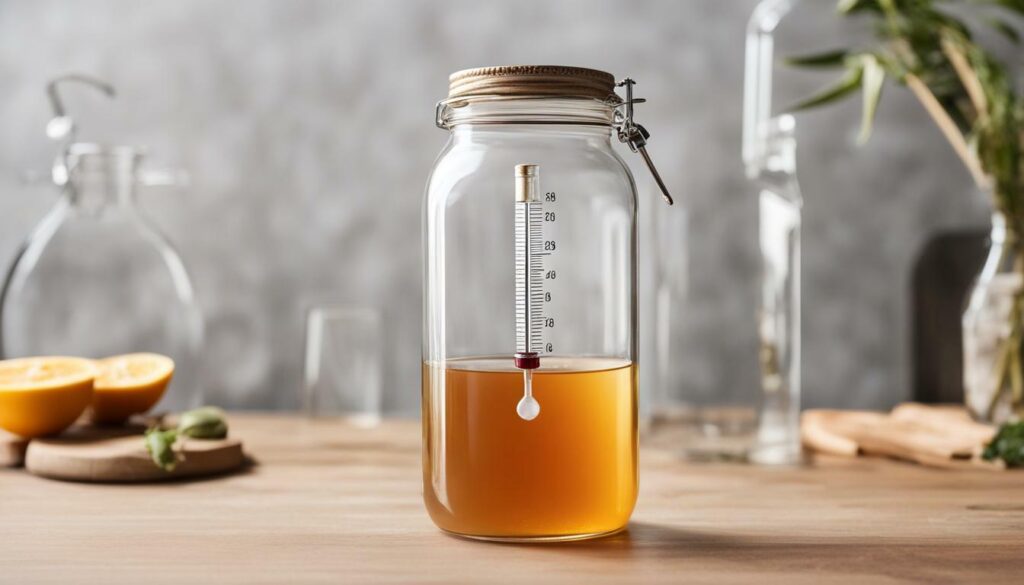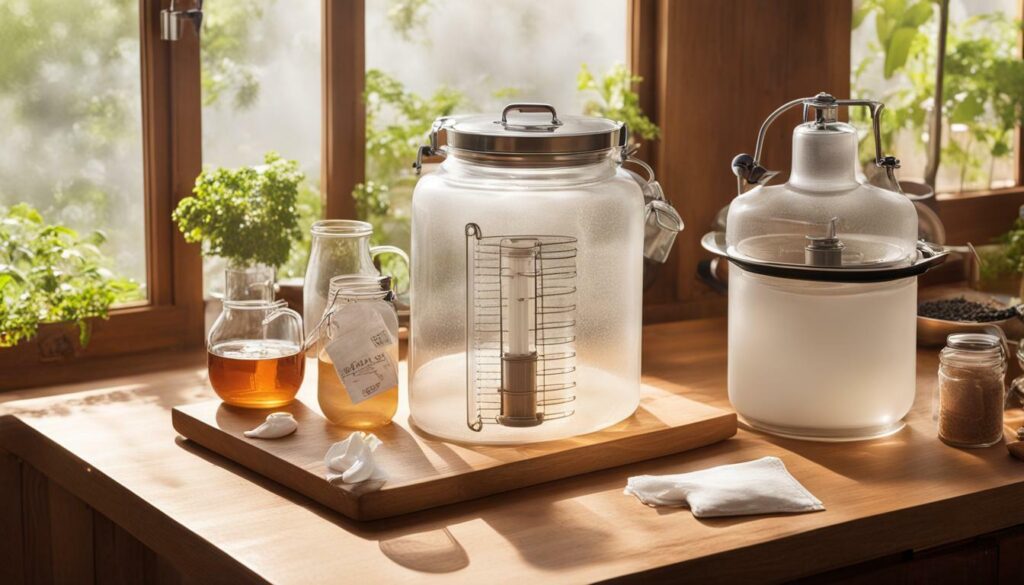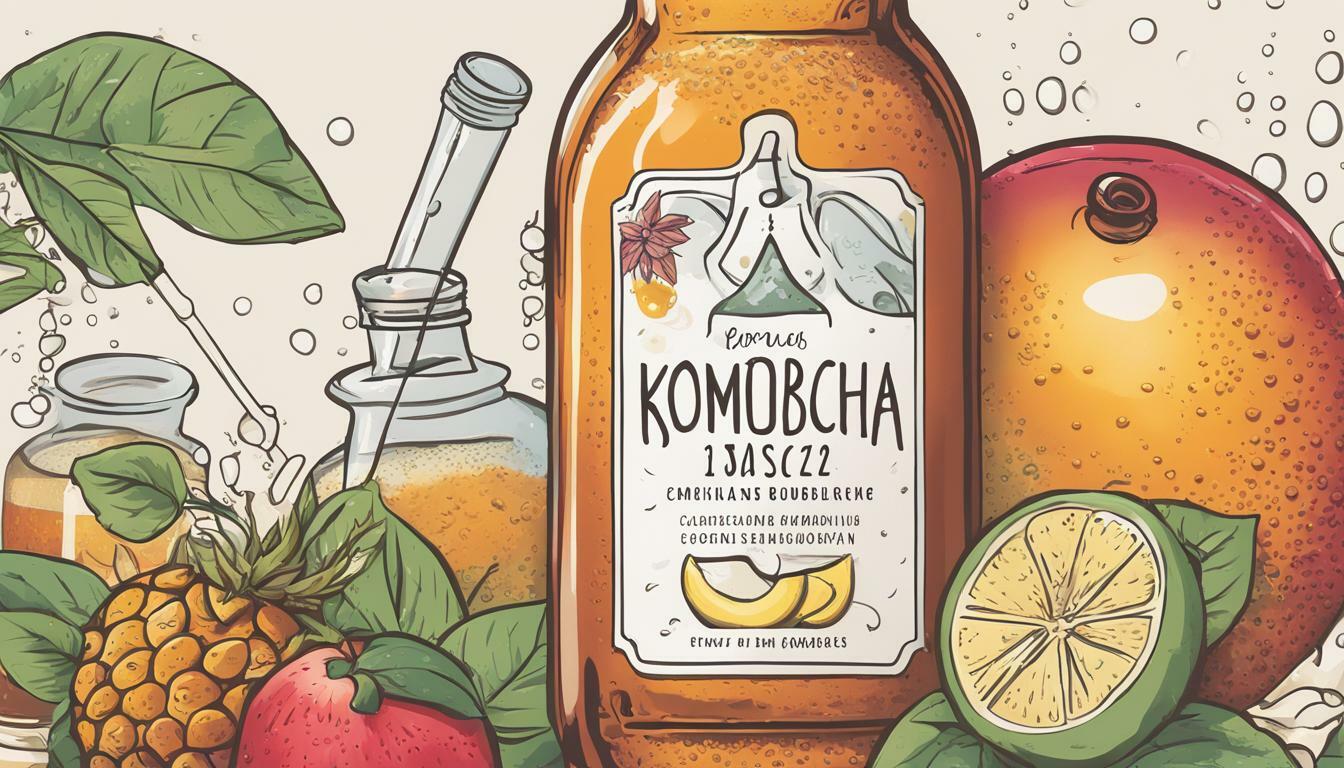As kombucha gains popularity as a health drink, many people have questions about its alcohol content. Kombucha is a fermented tea that naturally contains alcohol, but how much alcohol is in kombucha? In this article, we’ll explore the factors that impact the alcohol content in kombucha, legal regulations for its production and consumption, and the potential health effects of consuming the alcohol present in kombucha.
Key Takeaways:
- Kombucha is a fermented tea that naturally contains alcohol.
- The alcohol content in kombucha can vary depending on factors such as fermentation time, temperature, and ingredients used.
- Legal regulations surrounding the alcohol content in kombucha vary by country and state.
- Consuming kombucha with alcohol may have potential health effects, especially for pregnant women and those with alcohol sensitivities.
- Alcohol-free options are available for those who prefer to limit or avoid alcohol consumption.
- Homemade kombucha can be monitored and controlled for its alcohol content.
Understanding Kombucha’s Fermentation Process
Before diving into the alcohol content of kombucha, it’s important to understand how this fizzy, fermented tea is made. Kombucha is produced through the symbiotic culture of bacteria and yeast (SCOBY) consuming tea and sugar to create a tangy and slightly sweet beverage.
The SCOBY eats the sugar and converts it into various organic compounds, including acetic acid, lactic acid, and ethanol. These compounds give kombucha its distinctive flavor and aroma, as well as its potential alcohol content.
While the fermentation process is essential to creating kombucha, it also presents the risk of creating too much alcohol, which we will explore in more detail in the following sections.

Image source: seowriting.ai
Factors Impacting Kombucha’s Alcohol Content
Kombucha’s alcohol content can vary depending on a variety of factors, including the ingredients used and the fermentation process. Here are some key factors that can impact the alcohol content of your kombucha:
| Factor | Impact on Alcohol Content |
|---|---|
| Fermentation Time | The longer your kombucha ferments, the higher the alcohol content may become. Keep in mind that the longer you ferment your kombucha, the more sour it will taste. |
| Fermentation Temperature | The temperature at which your kombucha ferments can also impact its alcohol content. Warmer temperatures can lead to higher alcohol content, while cooler temperatures may produce less alcohol. |
| Type of Tea and Sugar | The type of tea and sugar you use to make your kombucha can also influence its alcohol content. Some varieties of tea and sugar may contribute more to the production of alcohol. |
It’s important to note that these factors are not the only ones that can impact the alcohol content of your kombucha. Other variables, such as the strength of your SCOBY or the quality of your water, may also play a role.
To ensure that you have better control over the alcohol content of your kombucha, it’s a good idea to monitor these factors closely and adjust them as needed. By doing so, you can create a kombucha that meets your taste preferences while staying within safe alcohol limits.

Measuring Alcohol in Kombucha
If you’re interested in knowing the alcohol content of your kombucha, there are a few methods you can use to measure it. One common way is to use a hydrometer, which measures the specific gravity of a liquid. By taking measurements before and after fermentation, you can calculate the alcohol content based on the difference in specific gravity. However, this method can be imprecise and may not work well for kombucha, which can have varying levels of sugar and other substances.
Another option is to use an alcohol testing kit, which typically involves adding a few drops of kombucha to a test strip and comparing the color change to a chart. While this method can be more accurate, it may also be more expensive and may not be widely available.
It’s worth noting that measuring the alcohol content of kombucha isn’t always necessary or practical. If you’re buying store-bought kombucha, the alcohol content should be listed on the label and is typically below 0.5% ABV, which is the legal threshold for non-alcoholic beverages in most countries. If you’re making your own kombucha, you can control the alcohol content by adjusting variables such as fermentation time, temperature, and ingredients.
Image Description:
An image of a hydrometer used to measure the specific gravity of a liquid.

Legal Regulations for Kombucha’s Alcohol Content
Kombucha’s alcohol content is a topic of concern for many consumers, and for good reason. Depending on the fermentation process and other factors, kombucha can contain varying levels of alcohol, which can impact its legal status and labeling requirements.
In the United States, the Alcohol and Tobacco Tax and Trade Bureau (TTB) regulates the alcohol content in kombucha. According to their guidelines, kombucha containing more than 0.5% alcohol by volume (ABV) is considered an alcoholic beverage and must comply with labeling, licensing, and tax requirements.
It’s worth noting that alcohol content can vary widely among different brands and even between batches of the same brand. This can make it difficult for consumers to determine the alcohol content of their kombucha without specialized equipment or testing.
To ensure compliance with legal regulations and avoid any potential health risks associated with consuming too much alcohol, it’s important to choose reputable brands and to be aware of the alcohol content in the kombucha you consume.
Image alt text: A bottle of kombucha with a label stating the alcohol content as less than 0.5% ABV.
Health Effects of Kombucha’s Alcohol Content
Consuming alcohol-containing kombucha may have various health effects, both positive and negative, depending on the individual’s age, physical condition, and alcohol tolerance. While the alcohol content in commercially available kombucha is typically low, ranging from 0.5% to 3%, homemade kombucha can contain higher levels of alcohol if not properly monitored during fermentation.
For individuals who are pregnant or have alcohol sensitivities, it is important to consult a healthcare professional before consuming kombucha to assess any potential risks. Additionally, excessive consumption of alcohol-containing kombucha may lead to adverse effects, such as impaired motor function, dehydration, and increased risk of alcohol dependence.
On the other hand, moderate consumption of low-alcohol kombucha has been associated with certain health benefits, such as improved digestion, reduced inflammation, and enhanced immune system function. Kombucha also contains antioxidants and beneficial bacteria that may promote overall health and well-being.
It is important to note that the health effects of kombucha’s alcohol content are still being studied, and more research is needed to fully understand the potential risks and benefits associated with its consumption.
“While kombucha has been touted for its health benefits, it is important to be mindful of its alcohol content and to consume it in moderation to avoid any negative health effects.”

Alcohol-Free Kombucha Options
For those looking to limit their alcohol consumption or avoid it altogether, there are various alcohol-free kombucha options available. Many commercial kombucha brands offer low-alcohol or completely alcohol-free options. When selecting a brand, be sure to check the label to ensure the alcohol content meets your preferences and needs.
Another option is to make your own alcohol-free kombucha at home. This can be done by controlling the fermentation process and limiting the amount of time the SCOBY spends fermenting the tea and sugar mixture. By stopping the fermentation process before significant alcohol production occurs, you can ensure your homemade kombucha is alcohol-free.
If you are pregnant or have alcohol sensitivities, it is important to consult with a healthcare professional before consuming any kombucha, even if it is labeled as alcohol-free. Some commercial brands may still contain trace amounts of alcohol that could impact your health and wellbeing.

Remember, while alcohol is a natural byproduct of the fermentation process used to make kombucha, there are plenty of options available for those who wish to limit their consumption or avoid it altogether.
Monitoring Alcohol Content in Homemade Kombucha
For those brewing their own kombucha at home, it’s important to be mindful of the potential alcohol content in the finished product. Here are some tips to help you monitor and control the alcohol levels in your homemade brew:
| Tip | Description |
|---|---|
| Use a hydrometer | A hydrometer is a tool that measures the specific gravity of your kombucha, allowing you to track the progress of fermentation and estimate the alcohol content. Be sure to follow the manufacturer’s instructions carefully, and keep in mind that your readings may be affected by temperature and other factors. |
| Limit fermentation time | The longer you allow your kombucha to ferment, the greater the chance of increased alcohol content. To keep alcohol levels in check, consider reducing the fermentation time or monitoring the process closely to ensure you catch the “sweet spot” where the kombucha is tangy and effervescent but not overly alcoholic. |
| Control temperature | The temperature at which you ferment your kombucha can also impact the alcohol content. Higher temperatures may speed up fermentation and lead to increased alcohol production, while cooler temperatures may slow it down. Experiment with different temperature ranges to find what works best for you, and consider using a thermometer to track the temperature throughout the process. |
| Use low-alcohol yeasts | If you’re concerned about high alcohol levels in your kombucha, you can also try using specialized yeast strains that are designed to produce less alcohol. Look for strains like Saccharomyces boulardii or Brettanomyces bruxellensis and experiment with incorporating them into your SCOBY culture. |
Remember, the alcohol content in homemade kombucha can vary widely depending on a number of factors, so it’s important to be diligent and monitor the process closely. By following these tips and keeping a watchful eye on your brew, you can enjoy the many health benefits of kombucha without worrying about consuming too much alcohol.

Frequently Asked Questions About Kombucha’s Alcohol Content
Have questions about the alcohol content in kombucha? You’re not alone! Here are answers to some of the most frequently asked questions about this popular fermented beverage:
Q: How much alcohol is in kombucha?
The alcohol content in kombucha can vary widely depending on several factors, but it is typically between 0.5% and 3%. However, some brands may contain higher levels of alcohol, so it’s important to read the label carefully if you are concerned about your alcohol intake.
Q: Does all kombucha contain alcohol?
Yes, all kombucha contains some level of alcohol, as it is produced through the fermentation process by the SCOBY. However, the amount of alcohol can be negligible in some brands and should not be a concern for most people.
Q: Can pregnant women drink kombucha?
While kombucha contains only small amounts of alcohol, it is generally recommended that pregnant women avoid consuming any alcohol. If you are pregnant or nursing, it’s a good idea to talk to your doctor before drinking kombucha.
Q: Can I get drunk from drinking kombucha?
It is highly unlikely that you could get drunk from drinking kombucha, even if you consume multiple bottles. However, some people may be more sensitive to the effects of alcohol than others, so it’s important to monitor your own reactions and use caution.
Q: How can I tell if my kombucha is too high in alcohol?
You can test the alcohol content of your kombucha using a hydrometer or an alcohol testing kit. If you are making your own kombucha, it’s important to monitor the fermentation process carefully and follow recommended guidelines to keep the alcohol content within safe limits.
Q: Can I drink kombucha and still drive?
As long as you are consuming kombucha responsibly and in moderation, it should not affect your ability to drive. However, if you are concerned about the alcohol content, it’s always a good idea to err on the side of caution and avoid drinking kombucha before driving.

Remember: while kombucha can be a great way to support digestive health and immunity, it’s important to be aware of the alcohol content and consume it in moderation. If you have any concerns or questions, talk to your doctor or a healthcare professional.
Conclusion
In conclusion, it’s important to be aware of the alcohol content in kombucha and understand the factors that can impact it. While kombucha typically contains low levels of alcohol, factors like fermentation time, temperature, and ingredients used can affect the final alcohol content. It’s also crucial to be aware of legal regulations surrounding the alcohol content in kombucha, as different countries and states may have varying limits and requirements.
If you prefer to limit or avoid alcohol consumption altogether, there are alcohol-free options available, and you can always check the label or ask the manufacturer for more information about alcohol content. For those who make their own kombucha at home, it’s important to monitor and control the alcohol content to ensure it stays within desired limits.
Lastly, it’s important to consider the potential health effects of consuming alcohol in kombucha, particularly for pregnant women or individuals with alcohol sensitivities. By staying informed and making conscious choices, you can enjoy the health benefits of kombucha while also being mindful of its alcohol content.
